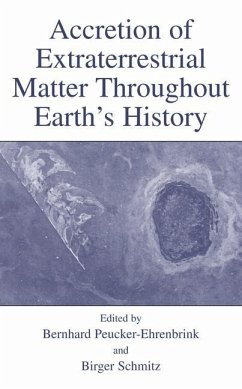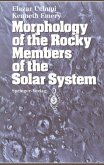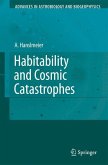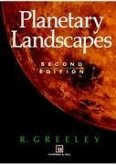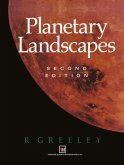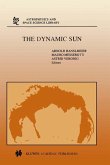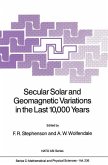Earth-Moon Relationships
Proceedings of the Conference held in Padova, Italy at the Accademia Galileiana di Scienze Lettere ed Arti, November 8-10, 2000
Herausgegeben:Barbieri, Cesare; Rampazzi, Francesca
Earth-Moon Relationships
Proceedings of the Conference held in Padova, Italy at the Accademia Galileiana di Scienze Lettere ed Arti, November 8-10, 2000
Herausgegeben:Barbieri, Cesare; Rampazzi, Francesca
- Broschiertes Buch
- Merkliste
- Auf die Merkliste
- Bewerten Bewerten
- Teilen
- Produkt teilen
- Produkterinnerung
- Produkterinnerung
Sediments and sedimentary processes on the Moon and Earth are very different. In the absence of water, an atmosphere, the magnetosphere, and much less oxygen in its rocks, the Moon has neither clay minerals nor carbonates, and no Fe3+. Mechanical weathering by impacts is the principal process of sediment generation on the Moon; on Earth, chemical weathering predominates. Whereas processes of sediment transport are principally ballistic on the Moon, movement by air, water and ice prevail on the Earth. The radical differences between Earth and Moon sediments make them useful end-members between…mehr
Andere Kunden interessierten sich auch für
![Accretion of Extraterrestrial Matter Throughout Earth¿s History Accretion of Extraterrestrial Matter Throughout Earth¿s History]() Accretion of Extraterrestrial Matter Throughout Earth¿s History75,99 €
Accretion of Extraterrestrial Matter Throughout Earth¿s History75,99 €![Morphology of the Rocky Members of the Solar System Morphology of the Rocky Members of the Solar System]() Elazar UchupiMorphology of the Rocky Members of the Solar System38,99 €
Elazar UchupiMorphology of the Rocky Members of the Solar System38,99 €![Habitability and Cosmic Catastrophes Habitability and Cosmic Catastrophes]() Arnold HanslmeierHabitability and Cosmic Catastrophes104,99 €
Arnold HanslmeierHabitability and Cosmic Catastrophes104,99 €![Planetary Landscapes Planetary Landscapes]() R. GreeleyPlanetary Landscapes115,99 €
R. GreeleyPlanetary Landscapes115,99 €![Planetary Landscapes Planetary Landscapes]() R. GreeleyPlanetary Landscapes229,99 €
R. GreeleyPlanetary Landscapes229,99 €![The Dynamic Sun The Dynamic Sun]() The Dynamic Sun112,99 €
The Dynamic Sun112,99 €![Secular Solar and Geomagnetic Variations in the Last 10,000 Years Secular Solar and Geomagnetic Variations in the Last 10,000 Years]() Secular Solar and Geomagnetic Variations in the Last 10,000 Years153,99 €
Secular Solar and Geomagnetic Variations in the Last 10,000 Years153,99 €-
-
-
Sediments and sedimentary processes on the Moon and Earth are very different. In the absence of water, an atmosphere, the magnetosphere, and much less oxygen in its rocks, the Moon has neither clay minerals nor carbonates, and no Fe3+. Mechanical weathering by impacts is the principal process of sediment generation on the Moon; on Earth, chemical weathering predominates. Whereas processes of sediment transport are principally ballistic on the Moon, movement by air, water and ice prevail on the Earth. The radical differences between Earth and Moon sediments make them useful end-members between which all sediments of all terrestrial planetary bodies are expected to lie. The purpose of this paper is (l) to compare and contrast major characteristics of the origin, transportation, deposition, and preservation of sediments, especially dust, in the Earth and the Moon, and (2) to suggest how sediments of other rocky planetary bodies, especially Mars, may fit in-between the sediments of the Earth and the Moon.
Produktdetails
- Produktdetails
- Verlag: Springer / Springer Netherlands
- Artikelnr. des Verlages: 978-94-010-3855-3
- Softcover reprint of the original 1st edition 2001
- Seitenzahl: 588
- Erscheinungstermin: 20. November 2013
- Englisch
- Abmessung: 240mm x 160mm x 32mm
- Gewicht: 927g
- ISBN-13: 9789401038553
- ISBN-10: 9401038554
- Artikelnr.: 39915465
- Herstellerkennzeichnung
- Springer-Verlag GmbH
- Tiergartenstr. 17
- 69121 Heidelberg
- ProductSafety@springernature.com
- Verlag: Springer / Springer Netherlands
- Artikelnr. des Verlages: 978-94-010-3855-3
- Softcover reprint of the original 1st edition 2001
- Seitenzahl: 588
- Erscheinungstermin: 20. November 2013
- Englisch
- Abmessung: 240mm x 160mm x 32mm
- Gewicht: 927g
- ISBN-13: 9789401038553
- ISBN-10: 9401038554
- Artikelnr.: 39915465
- Herstellerkennzeichnung
- Springer-Verlag GmbH
- Tiergartenstr. 17
- 69121 Heidelberg
- ProductSafety@springernature.com
Welcome Address.- Goodly Frame, Spotty Globe: Earth and Moon in Renaissance Literature.- Sediments of the Moon and Earth as End-Members far Comparative Planetology.- The Moon in the 14th Century Frescoes in Padova.- The Importance of the Moon in Teaching Astronomy at the Primary School.- The Moon and the Origin of Life.- Sexual Satellites, Moonlight and the Nuptial Dances of Worms: The Influence of the Moon on the Reproduction of Marine Animals.- Abstract: Claire de Lune on the Italian Space Science Programme.- Fantastic New Chondrites, Achondrites, and Lunar Meteorites as the Result of Recent Meteorite Search Expeditions in Hot and Cold Deserts.- Lunar Influences on Climate.- Apollo Samples and the Geochemical Determination of Basaltic Achondrite Parent Bodies.- Abstract: Water: Communicator in Moon-Earth Relationships.- "Lunacy" in Mentally Disturbed Children.- Highlights from ICEUM4, the 4th International Conference on the Exploration and Utilisation of the Moon.- The D-CIXS X-Ray Spectrometer on ESA's SMART-1 Mission to the Moon.- Lunar and Planetary Perspectives on the Geological History of the Earth.- Moonstruck: How Realistic is the Moon Depicted in Classic Science Fiction Films?.- The Moon and Extra-Solar Planets.- Craters on the Moon from Galileo to Wegener: A Short History of the Impact Hypothesis, and Implications for the Study of Terrestrial Impact Craters.- Reckoning Time, Longitude and the History of the Earth's Rotation, Using the Moon.- Ancient Moons.- The Formation of Chemical Elements and Their Abundances in the Solar System.- A New View of the Moon in Light of Data from Clementine and Prospector Missions.- The Atmosphere of the Moon.- The Moon and Life on Earth.- Marine Animal Behaviour in Relation to Lunar Phase.- Moon-Struck: ArtistsRediscover Nature and Observe.- Nitrogen on the Moon: What Does It Tell Us?.- Search for Antimatter in Cosmic Rays Using the Moon.- Abstract: Mysteries of the Farside of the Moon: What Galileo Couldn't See.- Lunar Maps of the 17th and 18th Centuries. Tobias Mayer's Map and its 19th-Century Edition.- SMART-I: The First Time of Europe to the Moon. Wandering in the Earth-Moon Space.- Palaeolithic Timekeepers Looking at the Golden Gate of the Ecliptic; The Lunar Cycle and the Pleiades in the Cave of La-Tête-du-Lion (Ardèche, France) - 21,000 BP.- Lunar Influence on Plants.- A Perspective on the Earth from the Moon.- "Earth-Moon Relationships": Highlights of the Conference and Concluding Remarks.- The Dispute between Carlini-Plana and Laplace on the Theory ofthe Moon.- Abstract: On the Orbit of the Moon.- Geochemical Evidence for a Close Genetic Relationship of Earth and Moon.- Macro and Microcosmus: Moon Influence on the Human Body.- Lunar Rhythms in Forestry Traditions - Lunar-Correlated Phenomena in Tree Biology and Wood Properties.- Meteor Showers on the Lunar Atmosphere.- LUNAM 2000 (Lunar Atmosphere Mission).- Earthshine at the Rainbow Angle.- Seneca and the Moon: The Cultural Importance of Our Satellite.- The Moon, the Stars and the Milk.- Abstract: Science Fiction in Naples in the Middle of the 19th Century.- Moonlight without the Moon.- The Science Goals of ESA's SMART-1 Mission to the Moon.- Lunar Explorers Society: Goals and Activities.- Lunation and Primate Menses.- Abstract: Mapping the Moon with SIR, An Infrared Spectrometer for SMART-1.- Radioastronomy and Radiointerferometry on the "Hidden" Lunar Surface.- The Moon in the Classic Maya World.- The Response of the 11 August 1999 Total Solar Eclipse in the Geomagnetic Field.- Variations inthe Mortality with Respect to Lunar Phases.
Welcome Address.- Goodly Frame, Spotty Globe: Earth and Moon in Renaissance Literature.- Sediments of the Moon and Earth as End-Members far Comparative Planetology.- The Moon in the 14th Century Frescoes in Padova.- The Importance of the Moon in Teaching Astronomy at the Primary School.- The Moon and the Origin of Life.- Sexual Satellites, Moonlight and the Nuptial Dances of Worms: The Influence of the Moon on the Reproduction of Marine Animals.- Abstract: Claire de Lune on the Italian Space Science Programme.- Fantastic New Chondrites, Achondrites, and Lunar Meteorites as the Result of Recent Meteorite Search Expeditions in Hot and Cold Deserts.- Lunar Influences on Climate.- Apollo Samples and the Geochemical Determination of Basaltic Achondrite Parent Bodies.- Abstract: Water: Communicator in Moon-Earth Relationships.- "Lunacy" in Mentally Disturbed Children.- Highlights from ICEUM4, the 4th International Conference on the Exploration and Utilisation of the Moon.- The D-CIXS X-Ray Spectrometer on ESA's SMART-1 Mission to the Moon.- Lunar and Planetary Perspectives on the Geological History of the Earth.- Moonstruck: How Realistic is the Moon Depicted in Classic Science Fiction Films?.- The Moon and Extra-Solar Planets.- Craters on the Moon from Galileo to Wegener: A Short History of the Impact Hypothesis, and Implications for the Study of Terrestrial Impact Craters.- Reckoning Time, Longitude and the History of the Earth's Rotation, Using the Moon.- Ancient Moons.- The Formation of Chemical Elements and Their Abundances in the Solar System.- A New View of the Moon in Light of Data from Clementine and Prospector Missions.- The Atmosphere of the Moon.- The Moon and Life on Earth.- Marine Animal Behaviour in Relation to Lunar Phase.- Moon-Struck: ArtistsRediscover Nature and Observe.- Nitrogen on the Moon: What Does It Tell Us?.- Search for Antimatter in Cosmic Rays Using the Moon.- Abstract: Mysteries of the Farside of the Moon: What Galileo Couldn't See.- Lunar Maps of the 17th and 18th Centuries. Tobias Mayer's Map and its 19th-Century Edition.- SMART-I: The First Time of Europe to the Moon. Wandering in the Earth-Moon Space.- Palaeolithic Timekeepers Looking at the Golden Gate of the Ecliptic; The Lunar Cycle and the Pleiades in the Cave of La-Tête-du-Lion (Ardèche, France) - 21,000 BP.- Lunar Influence on Plants.- A Perspective on the Earth from the Moon.- "Earth-Moon Relationships": Highlights of the Conference and Concluding Remarks.- The Dispute between Carlini-Plana and Laplace on the Theory ofthe Moon.- Abstract: On the Orbit of the Moon.- Geochemical Evidence for a Close Genetic Relationship of Earth and Moon.- Macro and Microcosmus: Moon Influence on the Human Body.- Lunar Rhythms in Forestry Traditions - Lunar-Correlated Phenomena in Tree Biology and Wood Properties.- Meteor Showers on the Lunar Atmosphere.- LUNAM 2000 (Lunar Atmosphere Mission).- Earthshine at the Rainbow Angle.- Seneca and the Moon: The Cultural Importance of Our Satellite.- The Moon, the Stars and the Milk.- Abstract: Science Fiction in Naples in the Middle of the 19th Century.- Moonlight without the Moon.- The Science Goals of ESA's SMART-1 Mission to the Moon.- Lunar Explorers Society: Goals and Activities.- Lunation and Primate Menses.- Abstract: Mapping the Moon with SIR, An Infrared Spectrometer for SMART-1.- Radioastronomy and Radiointerferometry on the "Hidden" Lunar Surface.- The Moon in the Classic Maya World.- The Response of the 11 August 1999 Total Solar Eclipse in the Geomagnetic Field.- Variations inthe Mortality with Respect to Lunar Phases.


